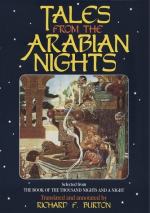When it was the Six Hundred and Third Night,
She said, It hath reached me, O auspicious King, that when Al-Sindibad said, “Answer thou, O my son,” the Prince replied, “I have heard tell that a merchant at whose house certain guests once alighted sent his slave girl to the market to buy a jar of clotted milk.[FN#241] So she bought it and set out on her return home; but on the way there passed over her a kite, holding and squeezing a serpent in its claws, and a drop of the serpent’s venom fell into the milk jar, unknown of the girl. So, when she came back, the merchant took the milk from her and drank of it, he and his guests; but hardly had it settled in their stomachs when they all died.[FN#242] Now consider, O King, whose was the fault in this matter?” Thereupon some present said, “It was the fault of the company who drank the milk without examining it.” And other some, “That of the girl, who left the jar without cover.” But al-Sindibad asked the Prince, “What sayest thou, O my son?” Answered he, “I say that the folk err; it was neither the fault of the damsel nor of the company, for their appointed hour was come, their divinely decreed provision was exhausted and Allah had fore ordained them to die thus."[FN#243] When the courtiers heard this, they marvelled greatly and lifted up their voices, blessing the King’s son, and saying, “O our lord, thou hast made a reply sans peur, and thou art the sagest man of thine age sans reproche.” “Indeed, I am no sage,” answered the Prince; “the blind Shaykh and the son of three years and the son of five years were wiser than I.” Said the bystanders, “O youth, tell us the stories of these three who were wiser than thou art, O youth.” Answered he, “With all my heart. I have heard tell this tale concerning the
Sandal-Wood Merchant and the Sharpers.[FN#244]




